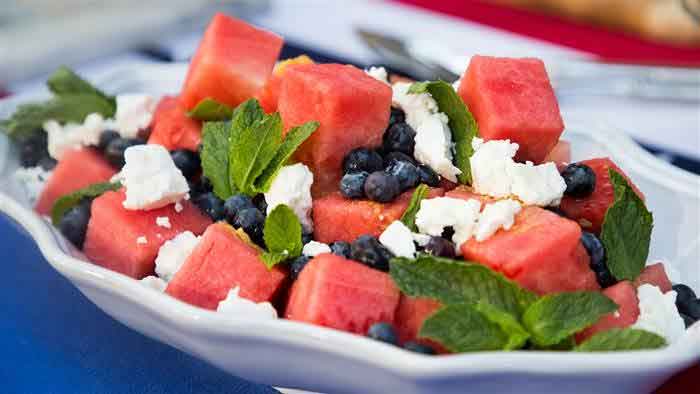During the holy month of Ramzan it becomes a challenge to drink plenty of water in short periods. Not consuming enough fluids can leave you dehydrated. So the best way to top up your water shortage in the holy month is to incorporate watermelons during sehar and iftar that will give you bursts of energy while keeping you hydrated.
Watermelon has high water content i.e. 92 per cent and is packed with essential rehydration salts like magnesium, calcium, sodium and potassium that actually hydrate you more effectively than water. Did you know that the side effects of dehydration are actually pretty serious and can cause headaches, poor concentration, fatigue and mood swings? Of course, you want to stay from all these symptoms during Ramzan. So make sure to include watermelons in your sehar and iftar. If you don’t feel like having the fruit, then you can go for fresh watermelon juice.
Low in calories
As far as fruits go, watermelon is one of the lowest in calories – only 46 calories per cup which is even lower than ‘low-sugar’ fruits such as berries. And the best part is that due to its high water content, consuming the fruit helps you feel full as well. Watermelon is fat-free. Many people worry about the amount of sugar in watermelon, but that is a bit of a misconception, because the sugar content is actually quite low. While a cup of diced watermelon has about nine grams of sugar, a medium banana contains 14 to 15 grams of sugar, as does a cup of blueberries. Don’t want to put on some extra pounds this fasting season? Include this figure-friendly fruit in your Ramzan menu to stay fit and healthy.
Rich in nutrients
Watermelons contain vitamins A and C, B vitamins, potassium and citrulline, an important amino acid. Just one small wedge of watermelon gives you a third of your daily recommended dose of vitamin C and vitamin A. Both have really important antioxidants that fight cancer. Watermelon is also high in carotenoids, including beta-carotene and most importantly it is packed with lycopene, the antioxidant pigment that gives the fruit its deep red colour. Just one cup of watermelon has 50 per cent more lycopene than a large fresh tomato. Lycopene from watermelon is a super antioxidant that protects all your cells from free radical damage and protects your immune system and is easily absorbed into the body.
Skin protector
Both lycopene and beta-carotene may also help protect your skin from sunburn. According to a research, lycopene acts like a sunscreen from within. Women who consumed at least 16 milligrams of lycopene a day for 12 weeks showed a reduction in the damaging effects of UVA and UVB rays, including sunburn and cellular damage. This is the equivalent of about two cups of diced watermelon. So what you can do is to consume 1 cup at sehar and the other one at iftar during the fasting month. Remember, eating lycopene-rich foods doesn’t mean you can skip the sunscreen when going out in the sun, but it does boost your protection!
Heart-healthy fruit
Watermelon is a heart-healthy food. Some studies suggest that lycopene may have cardiovascular benefits, that include reducing the risk of stroke. Also it improves blood circulation and eases angina. As it is full of potassium, consuming the fruit on a regular basis helps lower high blood pressure. Watermelon is rich in antioxidant vitamin C, which protects and repairs vein, artery and heart tissue and aids in lowering dietary cholesterol levels. A study showed watermelon to be particularly beneficial for post-menopausal women with high blood pressure.
Good for the eyes
The high content of lycopene found in watermelons helps in protecting eyes against oxidative damage and inflammation. It may also help in preventing age-related macular degeneration (AMD), which is a common eye problem that can cause blindness in older adults. Lycopene’s role as an antioxidant and anti-inflammatory compound may help in preventing age-related macular degeneration from developing and getting worse.
Improves digestion
Watermelon contains lots of water and a small amount of fibre – both of which are important for healthy digestion. Water aids in keeping your digestive tract moving efficiently. Eating water-rich fruits like watermelon can be very helpful for promoting normal bowel movements.












